Report on Principles of Health and Social Care in NHS Practices
VerifiedAdded on 2019/12/03
|12
|4407
|160
Report
AI Summary
This report provides a comprehensive analysis of the principles of health and social care within the NHS framework. It begins by identifying key support principles applicable to care individuals, emphasizing dignity, respect, choice, privacy, and independence. The report then outlines procedures for protecting clients and colleagues from harm, including risk identification, safety standards, emotional support, and confidentiality. It highlights the benefits of a person-centered approach, such as addressing individual issues, designing personalized care plans, and improving relationships. The report also addresses ethical dilemmas and conflicts that may arise in health and social care, such as conflicting opinions between care workers and service users. Furthermore, the report explores the implementation of policies, legislation, regulations, and codes of practice, including the Care Quality Commission and the Care Act 2014, and their impact on organizational policy and practice. It examines relevant theories supporting health and social care practice, such as Erikson's psychosocial stages, and analyzes how social processes impact service users. Finally, the report evaluates inter-professional working and the role of human resource managers in the NHS, offering recommendations for developing contributions to policy and practice.
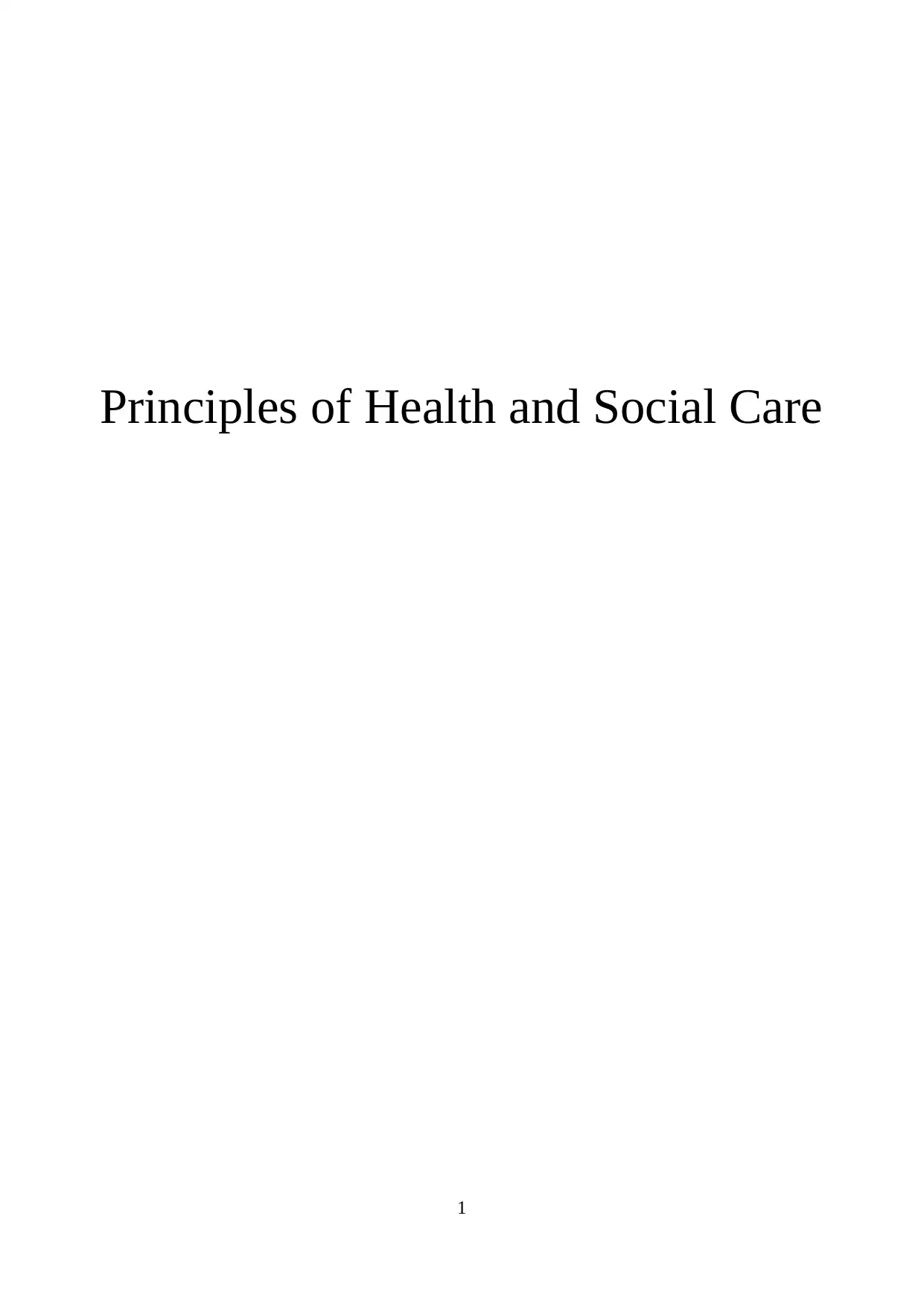
Principles of Health and Social Care
1
1
Paraphrase This Document
Need a fresh take? Get an instant paraphrase of this document with our AI Paraphraser
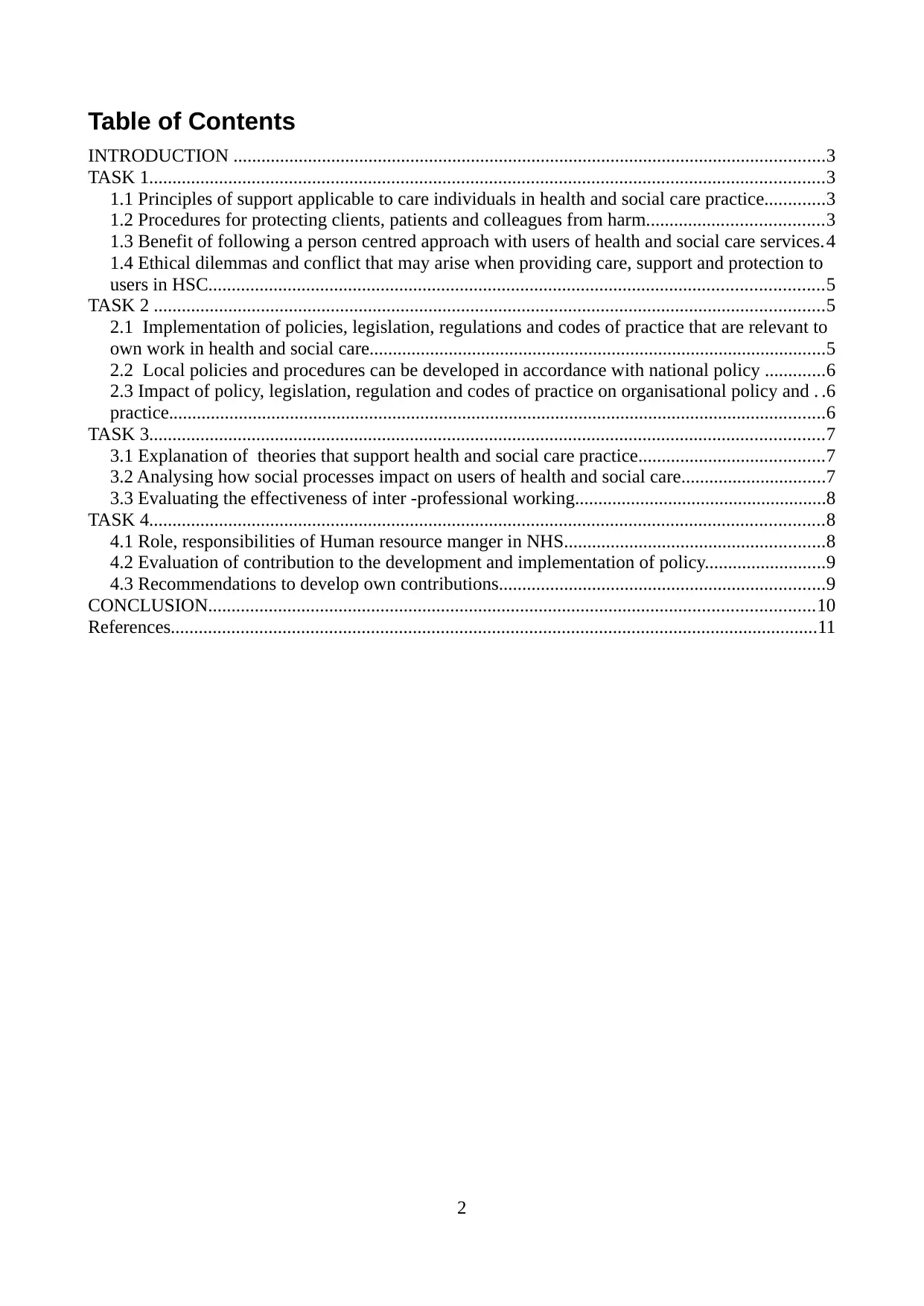
Table of Contents
INTRODUCTION ...............................................................................................................................3
TASK 1.................................................................................................................................................3
1.1 Principles of support applicable to care individuals in health and social care practice.............3
1.2 Procedures for protecting clients, patients and colleagues from harm......................................3
1.3 Benefit of following a person centred approach with users of health and social care services.4
1.4 Ethical dilemmas and conflict that may arise when providing care, support and protection to
users in HSC....................................................................................................................................5
TASK 2 ................................................................................................................................................5
2.1 Implementation of policies, legislation, regulations and codes of practice that are relevant to
own work in health and social care..................................................................................................5
2.2 Local policies and procedures can be developed in accordance with national policy .............6
2.3 Impact of policy, legislation, regulation and codes of practice on organisational policy and . .6
practice.............................................................................................................................................6
TASK 3.................................................................................................................................................7
3.1 Explanation of theories that support health and social care practice........................................7
3.2 Analysing how social processes impact on users of health and social care...............................7
3.3 Evaluating the effectiveness of inter -professional working......................................................8
TASK 4.................................................................................................................................................8
4.1 Role, responsibilities of Human resource manger in NHS........................................................8
4.2 Evaluation of contribution to the development and implementation of policy..........................9
4.3 Recommendations to develop own contributions......................................................................9
CONCLUSION..................................................................................................................................10
References...........................................................................................................................................11
2
INTRODUCTION ...............................................................................................................................3
TASK 1.................................................................................................................................................3
1.1 Principles of support applicable to care individuals in health and social care practice.............3
1.2 Procedures for protecting clients, patients and colleagues from harm......................................3
1.3 Benefit of following a person centred approach with users of health and social care services.4
1.4 Ethical dilemmas and conflict that may arise when providing care, support and protection to
users in HSC....................................................................................................................................5
TASK 2 ................................................................................................................................................5
2.1 Implementation of policies, legislation, regulations and codes of practice that are relevant to
own work in health and social care..................................................................................................5
2.2 Local policies and procedures can be developed in accordance with national policy .............6
2.3 Impact of policy, legislation, regulation and codes of practice on organisational policy and . .6
practice.............................................................................................................................................6
TASK 3.................................................................................................................................................7
3.1 Explanation of theories that support health and social care practice........................................7
3.2 Analysing how social processes impact on users of health and social care...............................7
3.3 Evaluating the effectiveness of inter -professional working......................................................8
TASK 4.................................................................................................................................................8
4.1 Role, responsibilities of Human resource manger in NHS........................................................8
4.2 Evaluation of contribution to the development and implementation of policy..........................9
4.3 Recommendations to develop own contributions......................................................................9
CONCLUSION..................................................................................................................................10
References...........................................................................................................................................11
2
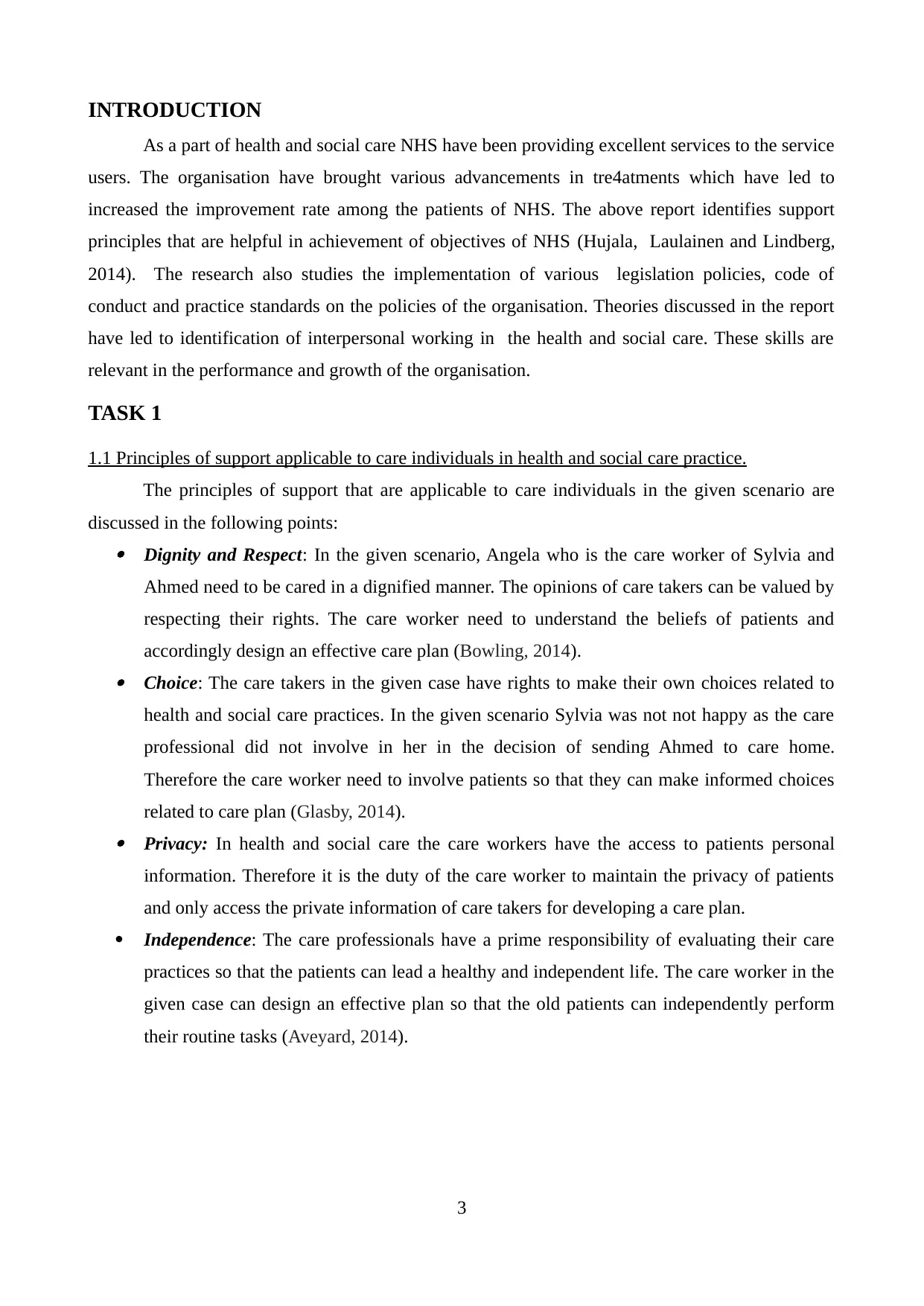
INTRODUCTION
As a part of health and social care NHS have been providing excellent services to the service
users. The organisation have brought various advancements in tre4atments which have led to
increased the improvement rate among the patients of NHS. The above report identifies support
principles that are helpful in achievement of objectives of NHS (Hujala, Laulainen and Lindberg,
2014). The research also studies the implementation of various legislation policies, code of
conduct and practice standards on the policies of the organisation. Theories discussed in the report
have led to identification of interpersonal working in the health and social care. These skills are
relevant in the performance and growth of the organisation.
TASK 1
1.1 Principles of support applicable to care individuals in health and social care practice.
The principles of support that are applicable to care individuals in the given scenario are
discussed in the following points: Dignity and Respect: In the given scenario, Angela who is the care worker of Sylvia and
Ahmed need to be cared in a dignified manner. The opinions of care takers can be valued by
respecting their rights. The care worker need to understand the beliefs of patients and
accordingly design an effective care plan (Bowling, 2014). Choice: The care takers in the given case have rights to make their own choices related to
health and social care practices. In the given scenario Sylvia was not not happy as the care
professional did not involve in her in the decision of sending Ahmed to care home.
Therefore the care worker need to involve patients so that they can make informed choices
related to care plan (Glasby, 2014). Privacy: In health and social care the care workers have the access to patients personal
information. Therefore it is the duty of the care worker to maintain the privacy of patients
and only access the private information of care takers for developing a care plan.
Independence: The care professionals have a prime responsibility of evaluating their care
practices so that the patients can lead a healthy and independent life. The care worker in the
given case can design an effective plan so that the old patients can independently perform
their routine tasks (Aveyard, 2014).
3
As a part of health and social care NHS have been providing excellent services to the service
users. The organisation have brought various advancements in tre4atments which have led to
increased the improvement rate among the patients of NHS. The above report identifies support
principles that are helpful in achievement of objectives of NHS (Hujala, Laulainen and Lindberg,
2014). The research also studies the implementation of various legislation policies, code of
conduct and practice standards on the policies of the organisation. Theories discussed in the report
have led to identification of interpersonal working in the health and social care. These skills are
relevant in the performance and growth of the organisation.
TASK 1
1.1 Principles of support applicable to care individuals in health and social care practice.
The principles of support that are applicable to care individuals in the given scenario are
discussed in the following points: Dignity and Respect: In the given scenario, Angela who is the care worker of Sylvia and
Ahmed need to be cared in a dignified manner. The opinions of care takers can be valued by
respecting their rights. The care worker need to understand the beliefs of patients and
accordingly design an effective care plan (Bowling, 2014). Choice: The care takers in the given case have rights to make their own choices related to
health and social care practices. In the given scenario Sylvia was not not happy as the care
professional did not involve in her in the decision of sending Ahmed to care home.
Therefore the care worker need to involve patients so that they can make informed choices
related to care plan (Glasby, 2014). Privacy: In health and social care the care workers have the access to patients personal
information. Therefore it is the duty of the care worker to maintain the privacy of patients
and only access the private information of care takers for developing a care plan.
Independence: The care professionals have a prime responsibility of evaluating their care
practices so that the patients can lead a healthy and independent life. The care worker in the
given case can design an effective plan so that the old patients can independently perform
their routine tasks (Aveyard, 2014).
3
⊘ This is a preview!⊘
Do you want full access?
Subscribe today to unlock all pages.

Trusted by 1+ million students worldwide
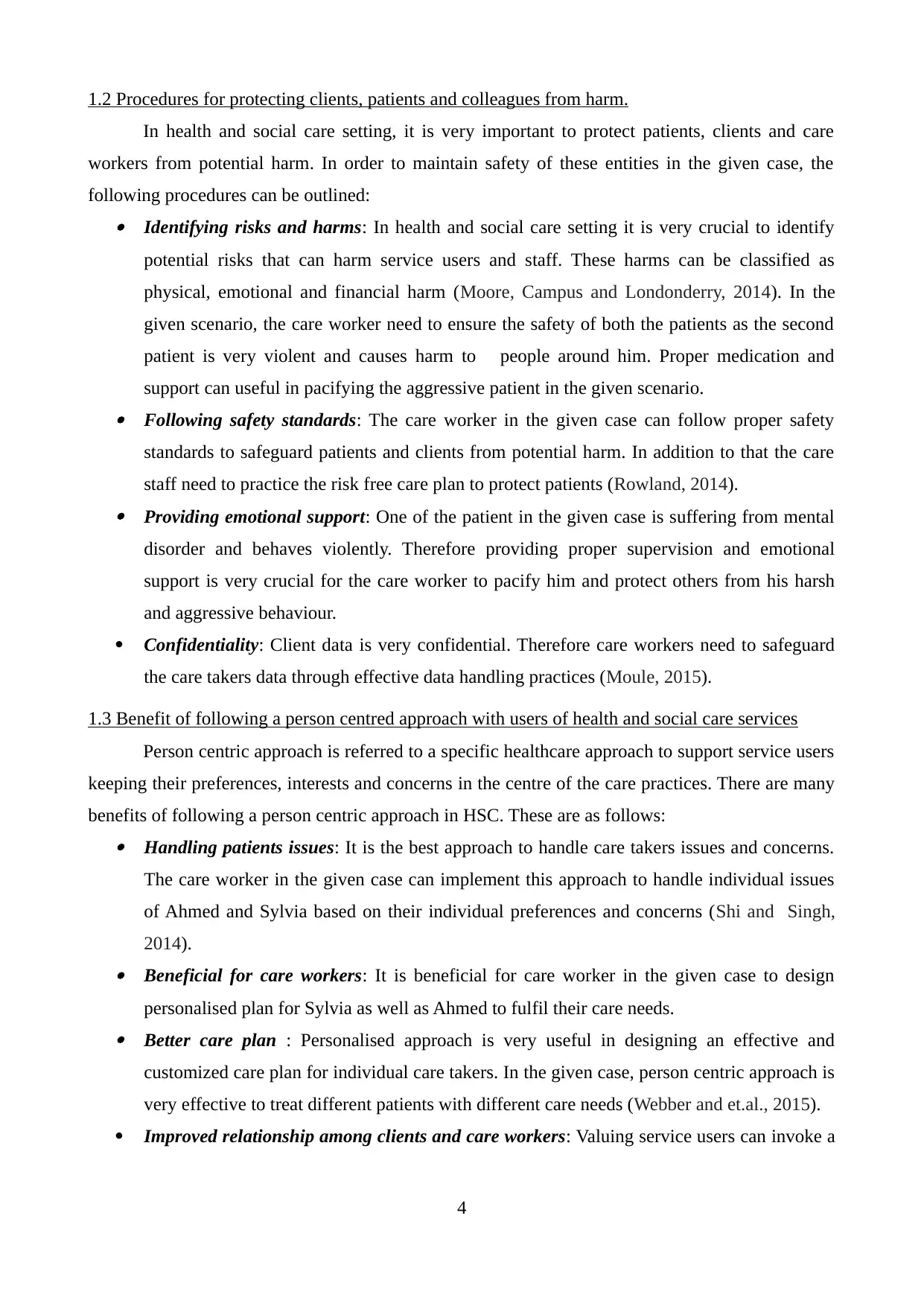
1.2 Procedures for protecting clients, patients and colleagues from harm.
In health and social care setting, it is very important to protect patients, clients and care
workers from potential harm. In order to maintain safety of these entities in the given case, the
following procedures can be outlined: Identifying risks and harms: In health and social care setting it is very crucial to identify
potential risks that can harm service users and staff. These harms can be classified as
physical, emotional and financial harm (Moore, Campus and Londonderry, 2014). In the
given scenario, the care worker need to ensure the safety of both the patients as the second
patient is very violent and causes harm to people around him. Proper medication and
support can useful in pacifying the aggressive patient in the given scenario. Following safety standards: The care worker in the given case can follow proper safety
standards to safeguard patients and clients from potential harm. In addition to that the care
staff need to practice the risk free care plan to protect patients (Rowland, 2014). Providing emotional support: One of the patient in the given case is suffering from mental
disorder and behaves violently. Therefore providing proper supervision and emotional
support is very crucial for the care worker to pacify him and protect others from his harsh
and aggressive behaviour.
Confidentiality: Client data is very confidential. Therefore care workers need to safeguard
the care takers data through effective data handling practices (Moule, 2015).
1.3 Benefit of following a person centred approach with users of health and social care services
Person centric approach is referred to a specific healthcare approach to support service users
keeping their preferences, interests and concerns in the centre of the care practices. There are many
benefits of following a person centric approach in HSC. These are as follows: Handling patients issues: It is the best approach to handle care takers issues and concerns.
The care worker in the given case can implement this approach to handle individual issues
of Ahmed and Sylvia based on their individual preferences and concerns (Shi and Singh,
2014). Beneficial for care workers: It is beneficial for care worker in the given case to design
personalised plan for Sylvia as well as Ahmed to fulfil their care needs. Better care plan : Personalised approach is very useful in designing an effective and
customized care plan for individual care takers. In the given case, person centric approach is
very effective to treat different patients with different care needs (Webber and et.al., 2015).
Improved relationship among clients and care workers: Valuing service users can invoke a
4
In health and social care setting, it is very important to protect patients, clients and care
workers from potential harm. In order to maintain safety of these entities in the given case, the
following procedures can be outlined: Identifying risks and harms: In health and social care setting it is very crucial to identify
potential risks that can harm service users and staff. These harms can be classified as
physical, emotional and financial harm (Moore, Campus and Londonderry, 2014). In the
given scenario, the care worker need to ensure the safety of both the patients as the second
patient is very violent and causes harm to people around him. Proper medication and
support can useful in pacifying the aggressive patient in the given scenario. Following safety standards: The care worker in the given case can follow proper safety
standards to safeguard patients and clients from potential harm. In addition to that the care
staff need to practice the risk free care plan to protect patients (Rowland, 2014). Providing emotional support: One of the patient in the given case is suffering from mental
disorder and behaves violently. Therefore providing proper supervision and emotional
support is very crucial for the care worker to pacify him and protect others from his harsh
and aggressive behaviour.
Confidentiality: Client data is very confidential. Therefore care workers need to safeguard
the care takers data through effective data handling practices (Moule, 2015).
1.3 Benefit of following a person centred approach with users of health and social care services
Person centric approach is referred to a specific healthcare approach to support service users
keeping their preferences, interests and concerns in the centre of the care practices. There are many
benefits of following a person centric approach in HSC. These are as follows: Handling patients issues: It is the best approach to handle care takers issues and concerns.
The care worker in the given case can implement this approach to handle individual issues
of Ahmed and Sylvia based on their individual preferences and concerns (Shi and Singh,
2014). Beneficial for care workers: It is beneficial for care worker in the given case to design
personalised plan for Sylvia as well as Ahmed to fulfil their care needs. Better care plan : Personalised approach is very useful in designing an effective and
customized care plan for individual care takers. In the given case, person centric approach is
very effective to treat different patients with different care needs (Webber and et.al., 2015).
Improved relationship among clients and care workers: Valuing service users can invoke a
4
Paraphrase This Document
Need a fresh take? Get an instant paraphrase of this document with our AI Paraphraser
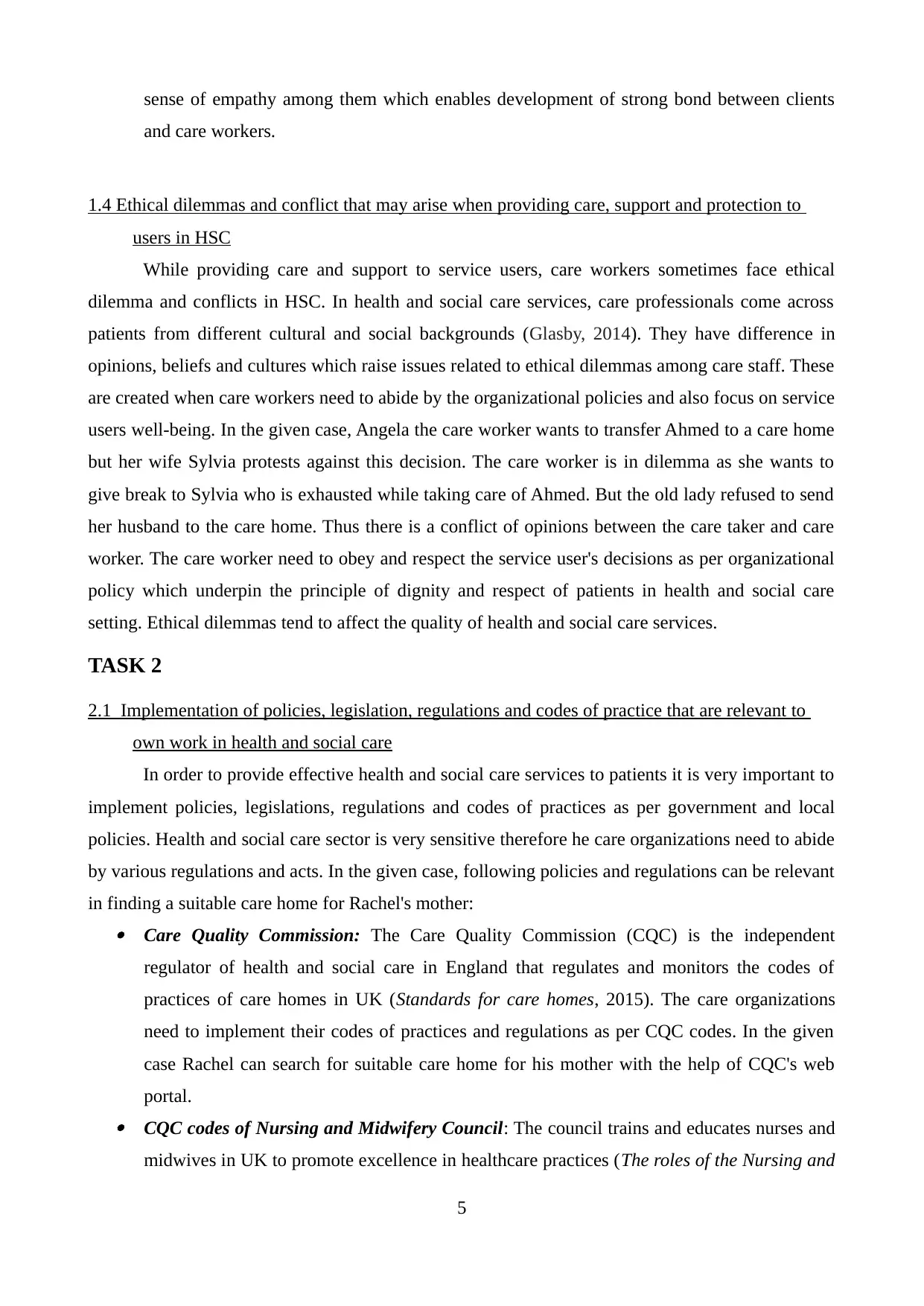
sense of empathy among them which enables development of strong bond between clients
and care workers.
1.4 Ethical dilemmas and conflict that may arise when providing care, support and protection to
users in HSC
While providing care and support to service users, care workers sometimes face ethical
dilemma and conflicts in HSC. In health and social care services, care professionals come across
patients from different cultural and social backgrounds (Glasby, 2014). They have difference in
opinions, beliefs and cultures which raise issues related to ethical dilemmas among care staff. These
are created when care workers need to abide by the organizational policies and also focus on service
users well-being. In the given case, Angela the care worker wants to transfer Ahmed to a care home
but her wife Sylvia protests against this decision. The care worker is in dilemma as she wants to
give break to Sylvia who is exhausted while taking care of Ahmed. But the old lady refused to send
her husband to the care home. Thus there is a conflict of opinions between the care taker and care
worker. The care worker need to obey and respect the service user's decisions as per organizational
policy which underpin the principle of dignity and respect of patients in health and social care
setting. Ethical dilemmas tend to affect the quality of health and social care services.
TASK 2
2.1 Implementation of policies, legislation, regulations and codes of practice that are relevant to
own work in health and social care
In order to provide effective health and social care services to patients it is very important to
implement policies, legislations, regulations and codes of practices as per government and local
policies. Health and social care sector is very sensitive therefore he care organizations need to abide
by various regulations and acts. In the given case, following policies and regulations can be relevant
in finding a suitable care home for Rachel's mother: Care Quality Commission: The Care Quality Commission (CQC) is the independent
regulator of health and social care in England that regulates and monitors the codes of
practices of care homes in UK (Standards for care homes, 2015). The care organizations
need to implement their codes of practices and regulations as per CQC codes. In the given
case Rachel can search for suitable care home for his mother with the help of CQC's web
portal. CQC codes of Nursing and Midwifery Council: The council trains and educates nurses and
midwives in UK to promote excellence in healthcare practices (The roles of the Nursing and
5
and care workers.
1.4 Ethical dilemmas and conflict that may arise when providing care, support and protection to
users in HSC
While providing care and support to service users, care workers sometimes face ethical
dilemma and conflicts in HSC. In health and social care services, care professionals come across
patients from different cultural and social backgrounds (Glasby, 2014). They have difference in
opinions, beliefs and cultures which raise issues related to ethical dilemmas among care staff. These
are created when care workers need to abide by the organizational policies and also focus on service
users well-being. In the given case, Angela the care worker wants to transfer Ahmed to a care home
but her wife Sylvia protests against this decision. The care worker is in dilemma as she wants to
give break to Sylvia who is exhausted while taking care of Ahmed. But the old lady refused to send
her husband to the care home. Thus there is a conflict of opinions between the care taker and care
worker. The care worker need to obey and respect the service user's decisions as per organizational
policy which underpin the principle of dignity and respect of patients in health and social care
setting. Ethical dilemmas tend to affect the quality of health and social care services.
TASK 2
2.1 Implementation of policies, legislation, regulations and codes of practice that are relevant to
own work in health and social care
In order to provide effective health and social care services to patients it is very important to
implement policies, legislations, regulations and codes of practices as per government and local
policies. Health and social care sector is very sensitive therefore he care organizations need to abide
by various regulations and acts. In the given case, following policies and regulations can be relevant
in finding a suitable care home for Rachel's mother: Care Quality Commission: The Care Quality Commission (CQC) is the independent
regulator of health and social care in England that regulates and monitors the codes of
practices of care homes in UK (Standards for care homes, 2015). The care organizations
need to implement their codes of practices and regulations as per CQC codes. In the given
case Rachel can search for suitable care home for his mother with the help of CQC's web
portal. CQC codes of Nursing and Midwifery Council: The council trains and educates nurses and
midwives in UK to promote excellence in healthcare practices (The roles of the Nursing and
5
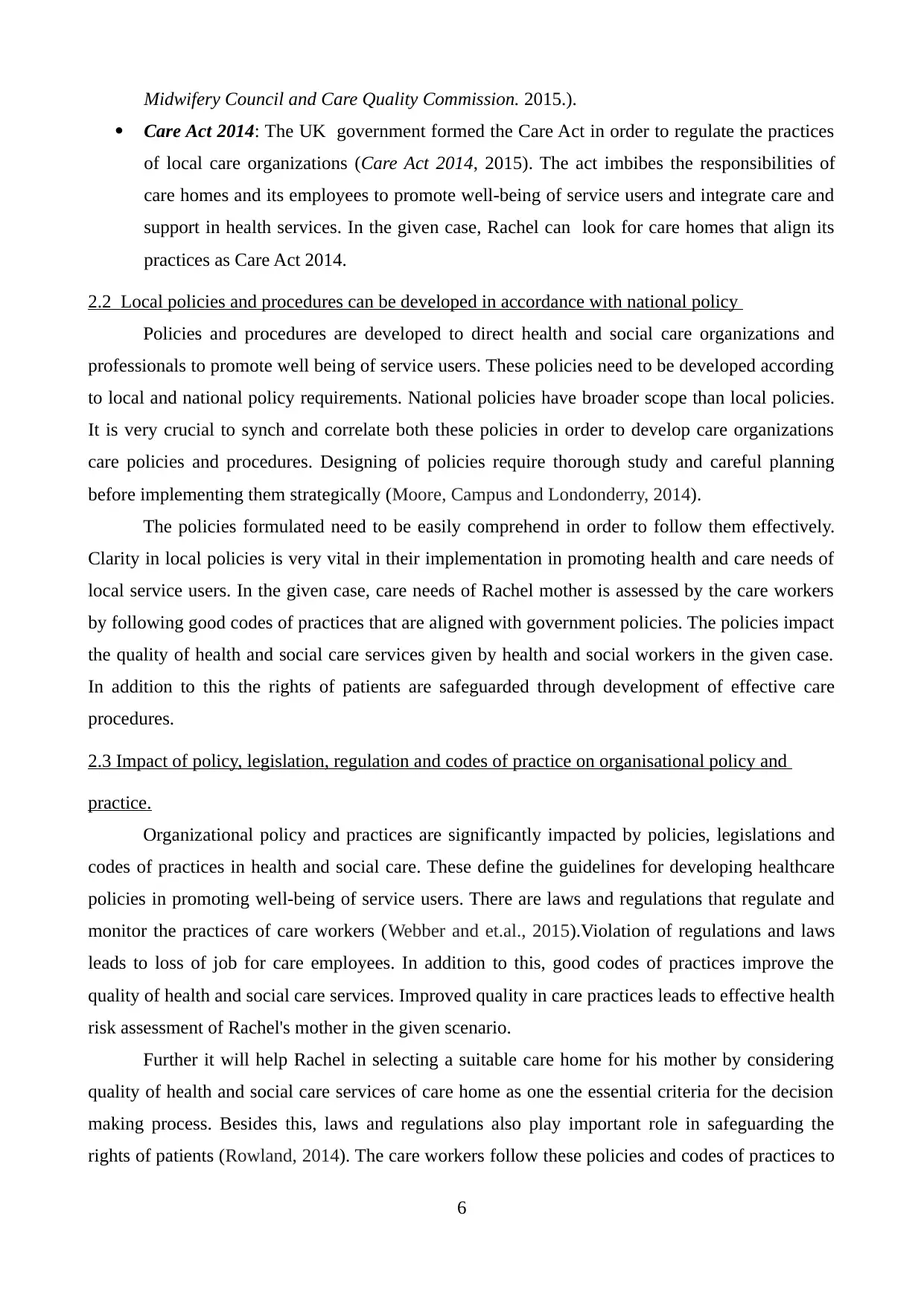
Midwifery Council and Care Quality Commission. 2015.).
Care Act 2014: The UK government formed the Care Act in order to regulate the practices
of local care organizations (Care Act 2014, 2015). The act imbibes the responsibilities of
care homes and its employees to promote well-being of service users and integrate care and
support in health services. In the given case, Rachel can look for care homes that align its
practices as Care Act 2014.
2.2 Local policies and procedures can be developed in accordance with national policy
Policies and procedures are developed to direct health and social care organizations and
professionals to promote well being of service users. These policies need to be developed according
to local and national policy requirements. National policies have broader scope than local policies.
It is very crucial to synch and correlate both these policies in order to develop care organizations
care policies and procedures. Designing of policies require thorough study and careful planning
before implementing them strategically (Moore, Campus and Londonderry, 2014).
The policies formulated need to be easily comprehend in order to follow them effectively.
Clarity in local policies is very vital in their implementation in promoting health and care needs of
local service users. In the given case, care needs of Rachel mother is assessed by the care workers
by following good codes of practices that are aligned with government policies. The policies impact
the quality of health and social care services given by health and social workers in the given case.
In addition to this the rights of patients are safeguarded through development of effective care
procedures.
2.3 Impact of policy, legislation, regulation and codes of practice on organisational policy and
practice.
Organizational policy and practices are significantly impacted by policies, legislations and
codes of practices in health and social care. These define the guidelines for developing healthcare
policies in promoting well-being of service users. There are laws and regulations that regulate and
monitor the practices of care workers (Webber and et.al., 2015).Violation of regulations and laws
leads to loss of job for care employees. In addition to this, good codes of practices improve the
quality of health and social care services. Improved quality in care practices leads to effective health
risk assessment of Rachel's mother in the given scenario.
Further it will help Rachel in selecting a suitable care home for his mother by considering
quality of health and social care services of care home as one the essential criteria for the decision
making process. Besides this, laws and regulations also play important role in safeguarding the
rights of patients (Rowland, 2014). The care workers follow these policies and codes of practices to
6
Care Act 2014: The UK government formed the Care Act in order to regulate the practices
of local care organizations (Care Act 2014, 2015). The act imbibes the responsibilities of
care homes and its employees to promote well-being of service users and integrate care and
support in health services. In the given case, Rachel can look for care homes that align its
practices as Care Act 2014.
2.2 Local policies and procedures can be developed in accordance with national policy
Policies and procedures are developed to direct health and social care organizations and
professionals to promote well being of service users. These policies need to be developed according
to local and national policy requirements. National policies have broader scope than local policies.
It is very crucial to synch and correlate both these policies in order to develop care organizations
care policies and procedures. Designing of policies require thorough study and careful planning
before implementing them strategically (Moore, Campus and Londonderry, 2014).
The policies formulated need to be easily comprehend in order to follow them effectively.
Clarity in local policies is very vital in their implementation in promoting health and care needs of
local service users. In the given case, care needs of Rachel mother is assessed by the care workers
by following good codes of practices that are aligned with government policies. The policies impact
the quality of health and social care services given by health and social workers in the given case.
In addition to this the rights of patients are safeguarded through development of effective care
procedures.
2.3 Impact of policy, legislation, regulation and codes of practice on organisational policy and
practice.
Organizational policy and practices are significantly impacted by policies, legislations and
codes of practices in health and social care. These define the guidelines for developing healthcare
policies in promoting well-being of service users. There are laws and regulations that regulate and
monitor the practices of care workers (Webber and et.al., 2015).Violation of regulations and laws
leads to loss of job for care employees. In addition to this, good codes of practices improve the
quality of health and social care services. Improved quality in care practices leads to effective health
risk assessment of Rachel's mother in the given scenario.
Further it will help Rachel in selecting a suitable care home for his mother by considering
quality of health and social care services of care home as one the essential criteria for the decision
making process. Besides this, laws and regulations also play important role in safeguarding the
rights of patients (Rowland, 2014). The care workers follow these policies and codes of practices to
6
⊘ This is a preview!⊘
Do you want full access?
Subscribe today to unlock all pages.

Trusted by 1+ million students worldwide
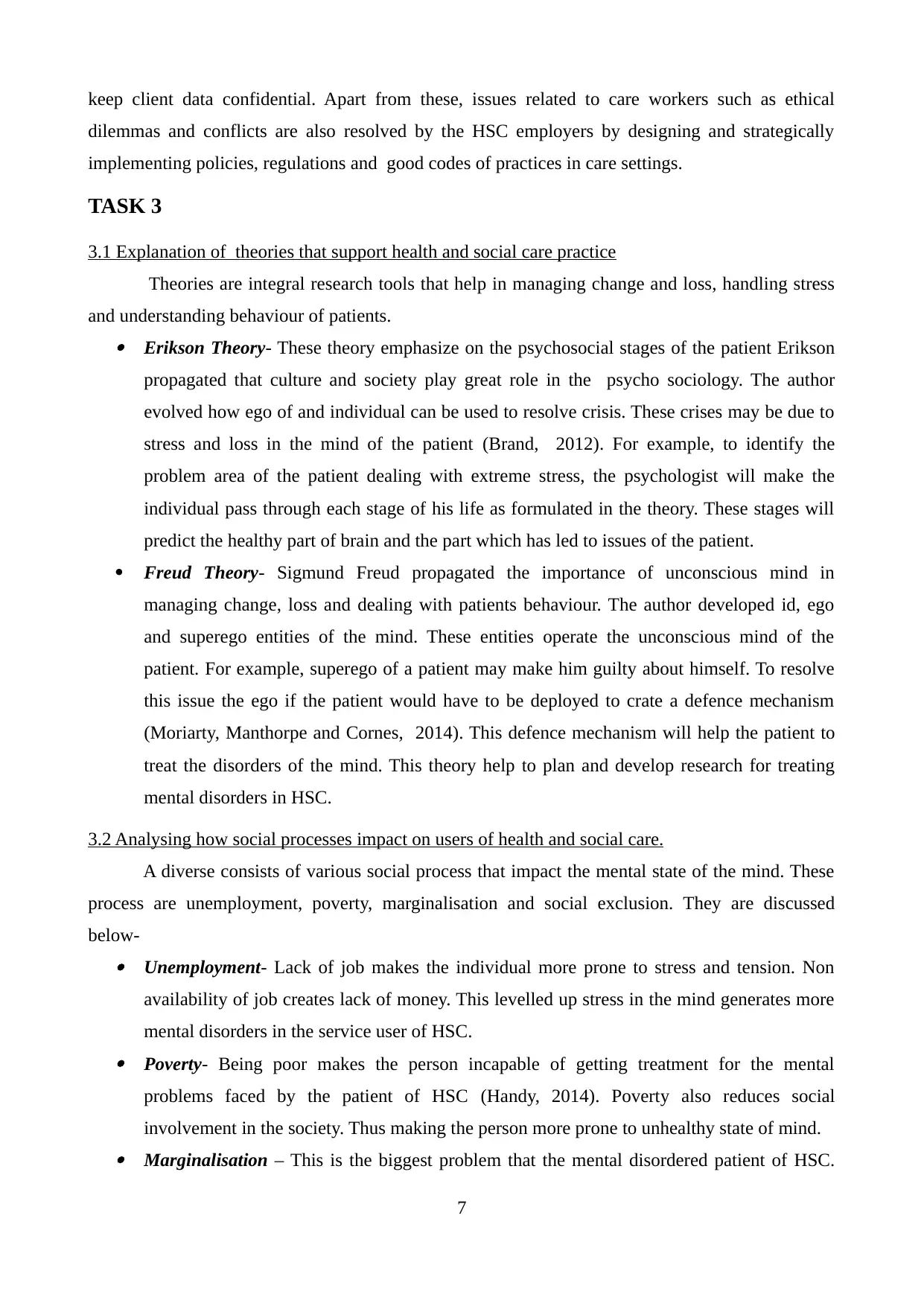
keep client data confidential. Apart from these, issues related to care workers such as ethical
dilemmas and conflicts are also resolved by the HSC employers by designing and strategically
implementing policies, regulations and good codes of practices in care settings.
TASK 3
3.1 Explanation of theories that support health and social care practice
Theories are integral research tools that help in managing change and loss, handling stress
and understanding behaviour of patients. Erikson Theory- These theory emphasize on the psychosocial stages of the patient Erikson
propagated that culture and society play great role in the psycho sociology. The author
evolved how ego of and individual can be used to resolve crisis. These crises may be due to
stress and loss in the mind of the patient (Brand, 2012). For example, to identify the
problem area of the patient dealing with extreme stress, the psychologist will make the
individual pass through each stage of his life as formulated in the theory. These stages will
predict the healthy part of brain and the part which has led to issues of the patient.
Freud Theory- Sigmund Freud propagated the importance of unconscious mind in
managing change, loss and dealing with patients behaviour. The author developed id, ego
and superego entities of the mind. These entities operate the unconscious mind of the
patient. For example, superego of a patient may make him guilty about himself. To resolve
this issue the ego if the patient would have to be deployed to crate a defence mechanism
(Moriarty, Manthorpe and Cornes, 2014). This defence mechanism will help the patient to
treat the disorders of the mind. This theory help to plan and develop research for treating
mental disorders in HSC.
3.2 Analysing how social processes impact on users of health and social care.
A diverse consists of various social process that impact the mental state of the mind. These
process are unemployment, poverty, marginalisation and social exclusion. They are discussed
below- Unemployment- Lack of job makes the individual more prone to stress and tension. Non
availability of job creates lack of money. This levelled up stress in the mind generates more
mental disorders in the service user of HSC. Poverty- Being poor makes the person incapable of getting treatment for the mental
problems faced by the patient of HSC (Handy, 2014). Poverty also reduces social
involvement in the society. Thus making the person more prone to unhealthy state of mind. Marginalisation – This is the biggest problem that the mental disordered patient of HSC.
7
dilemmas and conflicts are also resolved by the HSC employers by designing and strategically
implementing policies, regulations and good codes of practices in care settings.
TASK 3
3.1 Explanation of theories that support health and social care practice
Theories are integral research tools that help in managing change and loss, handling stress
and understanding behaviour of patients. Erikson Theory- These theory emphasize on the psychosocial stages of the patient Erikson
propagated that culture and society play great role in the psycho sociology. The author
evolved how ego of and individual can be used to resolve crisis. These crises may be due to
stress and loss in the mind of the patient (Brand, 2012). For example, to identify the
problem area of the patient dealing with extreme stress, the psychologist will make the
individual pass through each stage of his life as formulated in the theory. These stages will
predict the healthy part of brain and the part which has led to issues of the patient.
Freud Theory- Sigmund Freud propagated the importance of unconscious mind in
managing change, loss and dealing with patients behaviour. The author developed id, ego
and superego entities of the mind. These entities operate the unconscious mind of the
patient. For example, superego of a patient may make him guilty about himself. To resolve
this issue the ego if the patient would have to be deployed to crate a defence mechanism
(Moriarty, Manthorpe and Cornes, 2014). This defence mechanism will help the patient to
treat the disorders of the mind. This theory help to plan and develop research for treating
mental disorders in HSC.
3.2 Analysing how social processes impact on users of health and social care.
A diverse consists of various social process that impact the mental state of the mind. These
process are unemployment, poverty, marginalisation and social exclusion. They are discussed
below- Unemployment- Lack of job makes the individual more prone to stress and tension. Non
availability of job creates lack of money. This levelled up stress in the mind generates more
mental disorders in the service user of HSC. Poverty- Being poor makes the person incapable of getting treatment for the mental
problems faced by the patient of HSC (Handy, 2014). Poverty also reduces social
involvement in the society. Thus making the person more prone to unhealthy state of mind. Marginalisation – This is the biggest problem that the mental disordered patient of HSC.
7
Paraphrase This Document
Need a fresh take? Get an instant paraphrase of this document with our AI Paraphraser
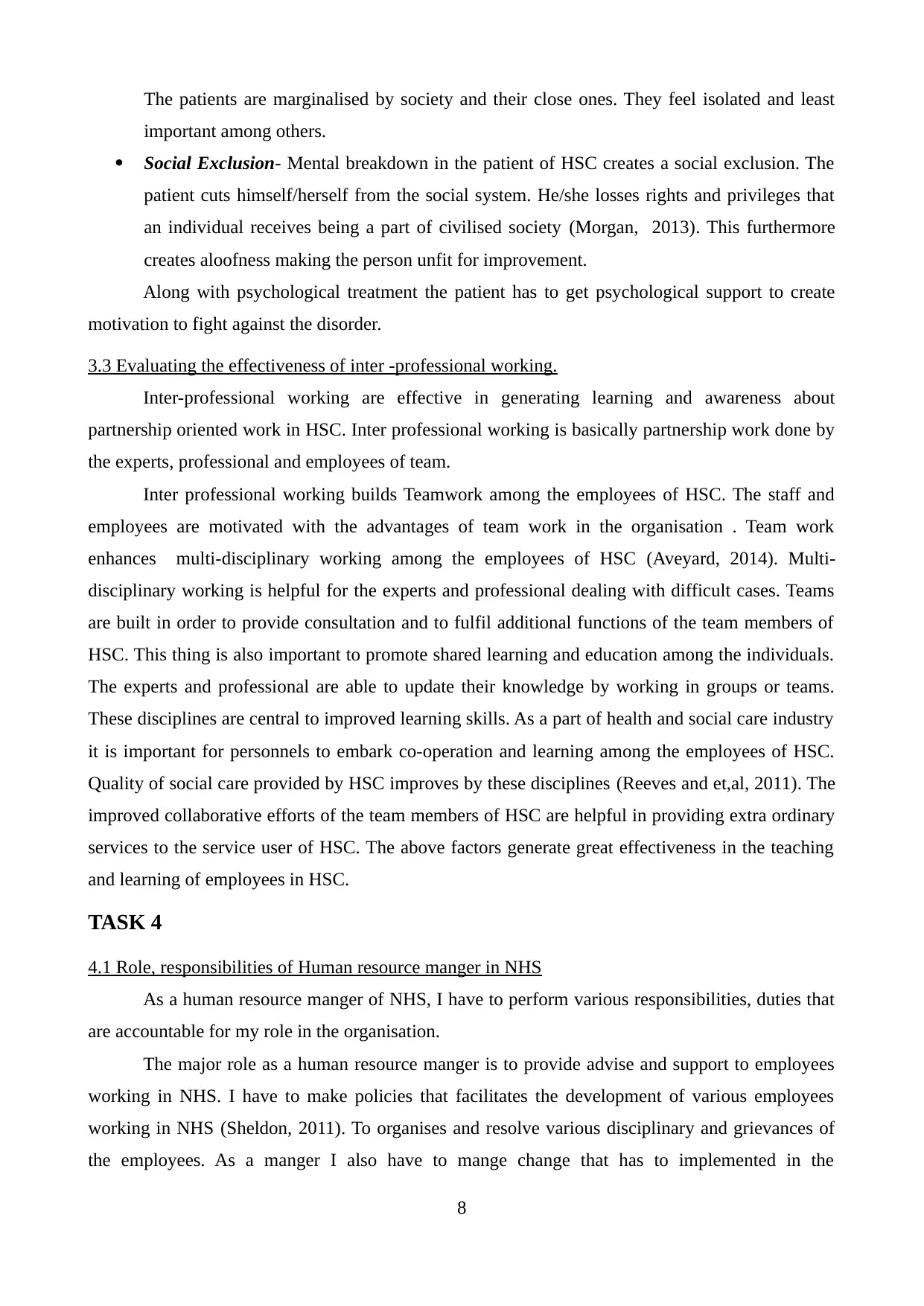
The patients are marginalised by society and their close ones. They feel isolated and least
important among others.
Social Exclusion- Mental breakdown in the patient of HSC creates a social exclusion. The
patient cuts himself/herself from the social system. He/she losses rights and privileges that
an individual receives being a part of civilised society (Morgan, 2013). This furthermore
creates aloofness making the person unfit for improvement.
Along with psychological treatment the patient has to get psychological support to create
motivation to fight against the disorder.
3.3 Evaluating the effectiveness of inter -professional working.
Inter-professional working are effective in generating learning and awareness about
partnership oriented work in HSC. Inter professional working is basically partnership work done by
the experts, professional and employees of team.
Inter professional working builds Teamwork among the employees of HSC. The staff and
employees are motivated with the advantages of team work in the organisation . Team work
enhances multi-disciplinary working among the employees of HSC (Aveyard, 2014). Multi-
disciplinary working is helpful for the experts and professional dealing with difficult cases. Teams
are built in order to provide consultation and to fulfil additional functions of the team members of
HSC. This thing is also important to promote shared learning and education among the individuals.
The experts and professional are able to update their knowledge by working in groups or teams.
These disciplines are central to improved learning skills. As a part of health and social care industry
it is important for personnels to embark co-operation and learning among the employees of HSC.
Quality of social care provided by HSC improves by these disciplines (Reeves and et,al, 2011). The
improved collaborative efforts of the team members of HSC are helpful in providing extra ordinary
services to the service user of HSC. The above factors generate great effectiveness in the teaching
and learning of employees in HSC.
TASK 4
4.1 Role, responsibilities of Human resource manger in NHS
As a human resource manger of NHS, I have to perform various responsibilities, duties that
are accountable for my role in the organisation.
The major role as a human resource manger is to provide advise and support to employees
working in NHS. I have to make policies that facilitates the development of various employees
working in NHS (Sheldon, 2011). To organises and resolve various disciplinary and grievances of
the employees. As a manger I also have to mange change that has to implemented in the
8
important among others.
Social Exclusion- Mental breakdown in the patient of HSC creates a social exclusion. The
patient cuts himself/herself from the social system. He/she losses rights and privileges that
an individual receives being a part of civilised society (Morgan, 2013). This furthermore
creates aloofness making the person unfit for improvement.
Along with psychological treatment the patient has to get psychological support to create
motivation to fight against the disorder.
3.3 Evaluating the effectiveness of inter -professional working.
Inter-professional working are effective in generating learning and awareness about
partnership oriented work in HSC. Inter professional working is basically partnership work done by
the experts, professional and employees of team.
Inter professional working builds Teamwork among the employees of HSC. The staff and
employees are motivated with the advantages of team work in the organisation . Team work
enhances multi-disciplinary working among the employees of HSC (Aveyard, 2014). Multi-
disciplinary working is helpful for the experts and professional dealing with difficult cases. Teams
are built in order to provide consultation and to fulfil additional functions of the team members of
HSC. This thing is also important to promote shared learning and education among the individuals.
The experts and professional are able to update their knowledge by working in groups or teams.
These disciplines are central to improved learning skills. As a part of health and social care industry
it is important for personnels to embark co-operation and learning among the employees of HSC.
Quality of social care provided by HSC improves by these disciplines (Reeves and et,al, 2011). The
improved collaborative efforts of the team members of HSC are helpful in providing extra ordinary
services to the service user of HSC. The above factors generate great effectiveness in the teaching
and learning of employees in HSC.
TASK 4
4.1 Role, responsibilities of Human resource manger in NHS
As a human resource manger of NHS, I have to perform various responsibilities, duties that
are accountable for my role in the organisation.
The major role as a human resource manger is to provide advise and support to employees
working in NHS. I have to make policies that facilitates the development of various employees
working in NHS (Sheldon, 2011). To organises and resolve various disciplinary and grievances of
the employees. As a manger I also have to mange change that has to implemented in the
8
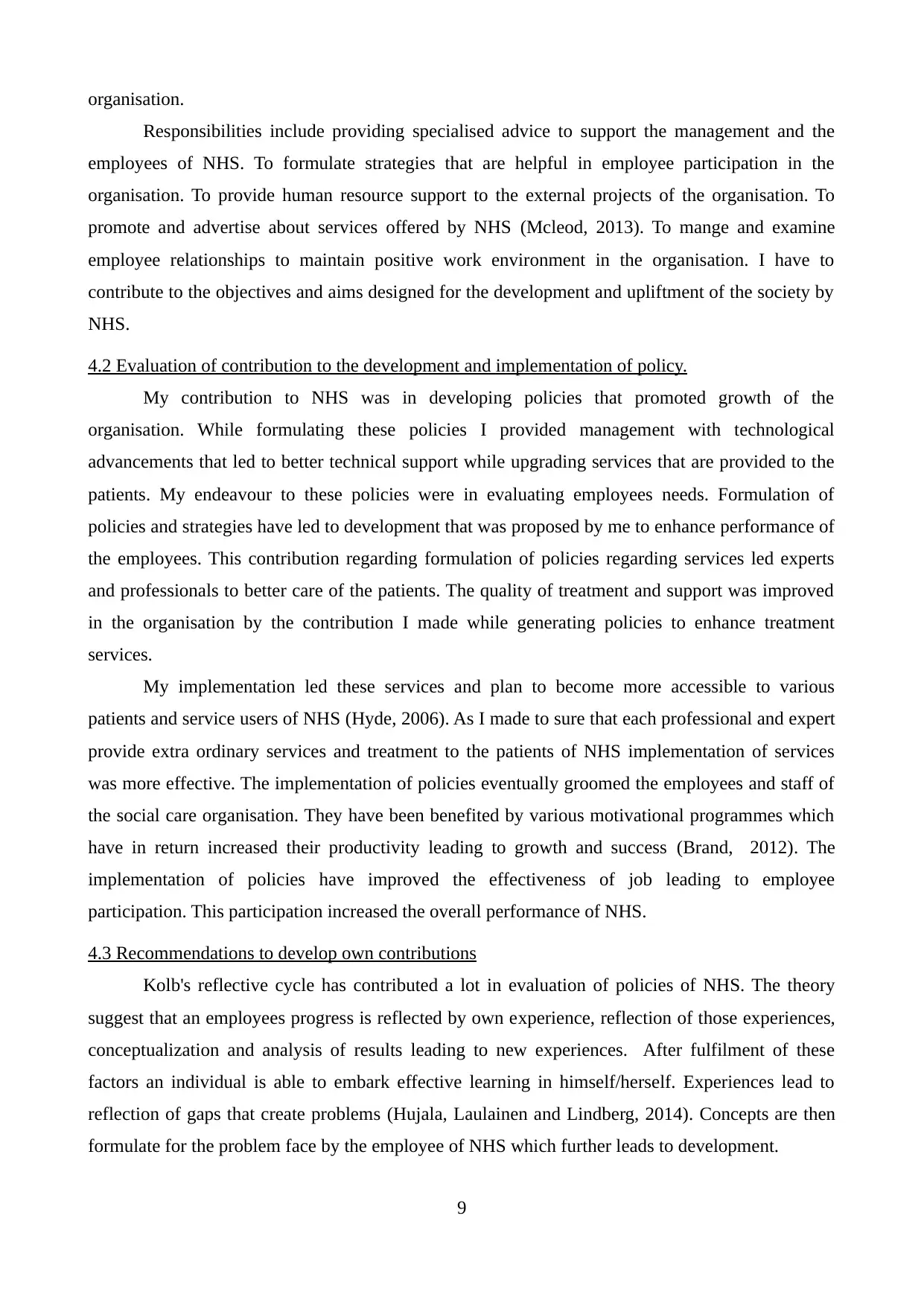
organisation.
Responsibilities include providing specialised advice to support the management and the
employees of NHS. To formulate strategies that are helpful in employee participation in the
organisation. To provide human resource support to the external projects of the organisation. To
promote and advertise about services offered by NHS (Mcleod, 2013). To mange and examine
employee relationships to maintain positive work environment in the organisation. I have to
contribute to the objectives and aims designed for the development and upliftment of the society by
NHS.
4.2 Evaluation of contribution to the development and implementation of policy.
My contribution to NHS was in developing policies that promoted growth of the
organisation. While formulating these policies I provided management with technological
advancements that led to better technical support while upgrading services that are provided to the
patients. My endeavour to these policies were in evaluating employees needs. Formulation of
policies and strategies have led to development that was proposed by me to enhance performance of
the employees. This contribution regarding formulation of policies regarding services led experts
and professionals to better care of the patients. The quality of treatment and support was improved
in the organisation by the contribution I made while generating policies to enhance treatment
services.
My implementation led these services and plan to become more accessible to various
patients and service users of NHS (Hyde, 2006). As I made to sure that each professional and expert
provide extra ordinary services and treatment to the patients of NHS implementation of services
was more effective. The implementation of policies eventually groomed the employees and staff of
the social care organisation. They have been benefited by various motivational programmes which
have in return increased their productivity leading to growth and success (Brand, 2012). The
implementation of policies have improved the effectiveness of job leading to employee
participation. This participation increased the overall performance of NHS.
4.3 Recommendations to develop own contributions
Kolb's reflective cycle has contributed a lot in evaluation of policies of NHS. The theory
suggest that an employees progress is reflected by own experience, reflection of those experiences,
conceptualization and analysis of results leading to new experiences. After fulfilment of these
factors an individual is able to embark effective learning in himself/herself. Experiences lead to
reflection of gaps that create problems (Hujala, Laulainen and Lindberg, 2014). Concepts are then
formulate for the problem face by the employee of NHS which further leads to development.
9
Responsibilities include providing specialised advice to support the management and the
employees of NHS. To formulate strategies that are helpful in employee participation in the
organisation. To provide human resource support to the external projects of the organisation. To
promote and advertise about services offered by NHS (Mcleod, 2013). To mange and examine
employee relationships to maintain positive work environment in the organisation. I have to
contribute to the objectives and aims designed for the development and upliftment of the society by
NHS.
4.2 Evaluation of contribution to the development and implementation of policy.
My contribution to NHS was in developing policies that promoted growth of the
organisation. While formulating these policies I provided management with technological
advancements that led to better technical support while upgrading services that are provided to the
patients. My endeavour to these policies were in evaluating employees needs. Formulation of
policies and strategies have led to development that was proposed by me to enhance performance of
the employees. This contribution regarding formulation of policies regarding services led experts
and professionals to better care of the patients. The quality of treatment and support was improved
in the organisation by the contribution I made while generating policies to enhance treatment
services.
My implementation led these services and plan to become more accessible to various
patients and service users of NHS (Hyde, 2006). As I made to sure that each professional and expert
provide extra ordinary services and treatment to the patients of NHS implementation of services
was more effective. The implementation of policies eventually groomed the employees and staff of
the social care organisation. They have been benefited by various motivational programmes which
have in return increased their productivity leading to growth and success (Brand, 2012). The
implementation of policies have improved the effectiveness of job leading to employee
participation. This participation increased the overall performance of NHS.
4.3 Recommendations to develop own contributions
Kolb's reflective cycle has contributed a lot in evaluation of policies of NHS. The theory
suggest that an employees progress is reflected by own experience, reflection of those experiences,
conceptualization and analysis of results leading to new experiences. After fulfilment of these
factors an individual is able to embark effective learning in himself/herself. Experiences lead to
reflection of gaps that create problems (Hujala, Laulainen and Lindberg, 2014). Concepts are then
formulate for the problem face by the employee of NHS which further leads to development.
9
⊘ This is a preview!⊘
Do you want full access?
Subscribe today to unlock all pages.

Trusted by 1+ million students worldwide
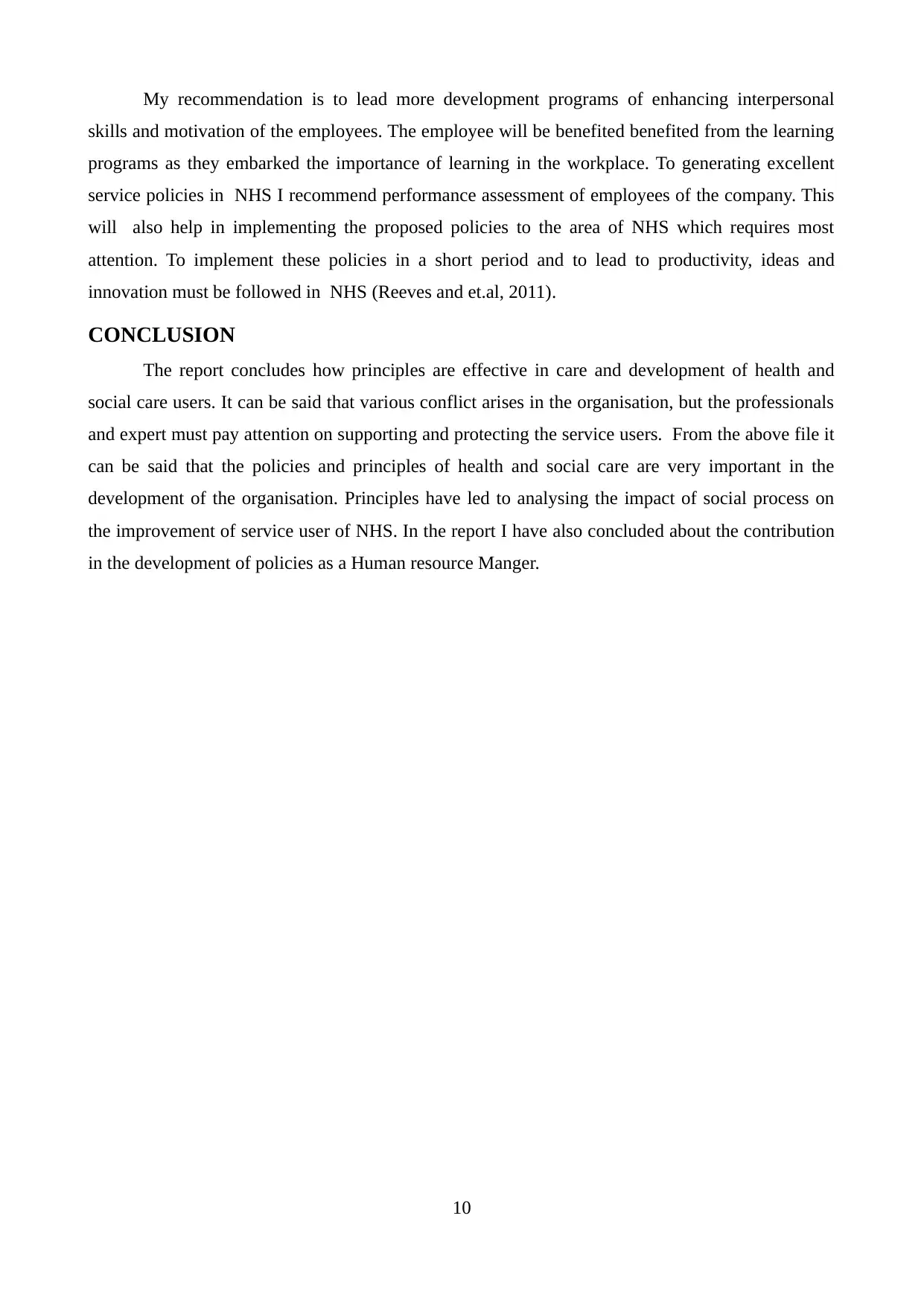
My recommendation is to lead more development programs of enhancing interpersonal
skills and motivation of the employees. The employee will be benefited benefited from the learning
programs as they embarked the importance of learning in the workplace. To generating excellent
service policies in NHS I recommend performance assessment of employees of the company. This
will also help in implementing the proposed policies to the area of NHS which requires most
attention. To implement these policies in a short period and to lead to productivity, ideas and
innovation must be followed in NHS (Reeves and et.al, 2011).
CONCLUSION
The report concludes how principles are effective in care and development of health and
social care users. It can be said that various conflict arises in the organisation, but the professionals
and expert must pay attention on supporting and protecting the service users. From the above file it
can be said that the policies and principles of health and social care are very important in the
development of the organisation. Principles have led to analysing the impact of social process on
the improvement of service user of NHS. In the report I have also concluded about the contribution
in the development of policies as a Human resource Manger.
10
skills and motivation of the employees. The employee will be benefited benefited from the learning
programs as they embarked the importance of learning in the workplace. To generating excellent
service policies in NHS I recommend performance assessment of employees of the company. This
will also help in implementing the proposed policies to the area of NHS which requires most
attention. To implement these policies in a short period and to lead to productivity, ideas and
innovation must be followed in NHS (Reeves and et.al, 2011).
CONCLUSION
The report concludes how principles are effective in care and development of health and
social care users. It can be said that various conflict arises in the organisation, but the professionals
and expert must pay attention on supporting and protecting the service users. From the above file it
can be said that the policies and principles of health and social care are very important in the
development of the organisation. Principles have led to analysing the impact of social process on
the improvement of service user of NHS. In the report I have also concluded about the contribution
in the development of policies as a Human resource Manger.
10
Paraphrase This Document
Need a fresh take? Get an instant paraphrase of this document with our AI Paraphraser
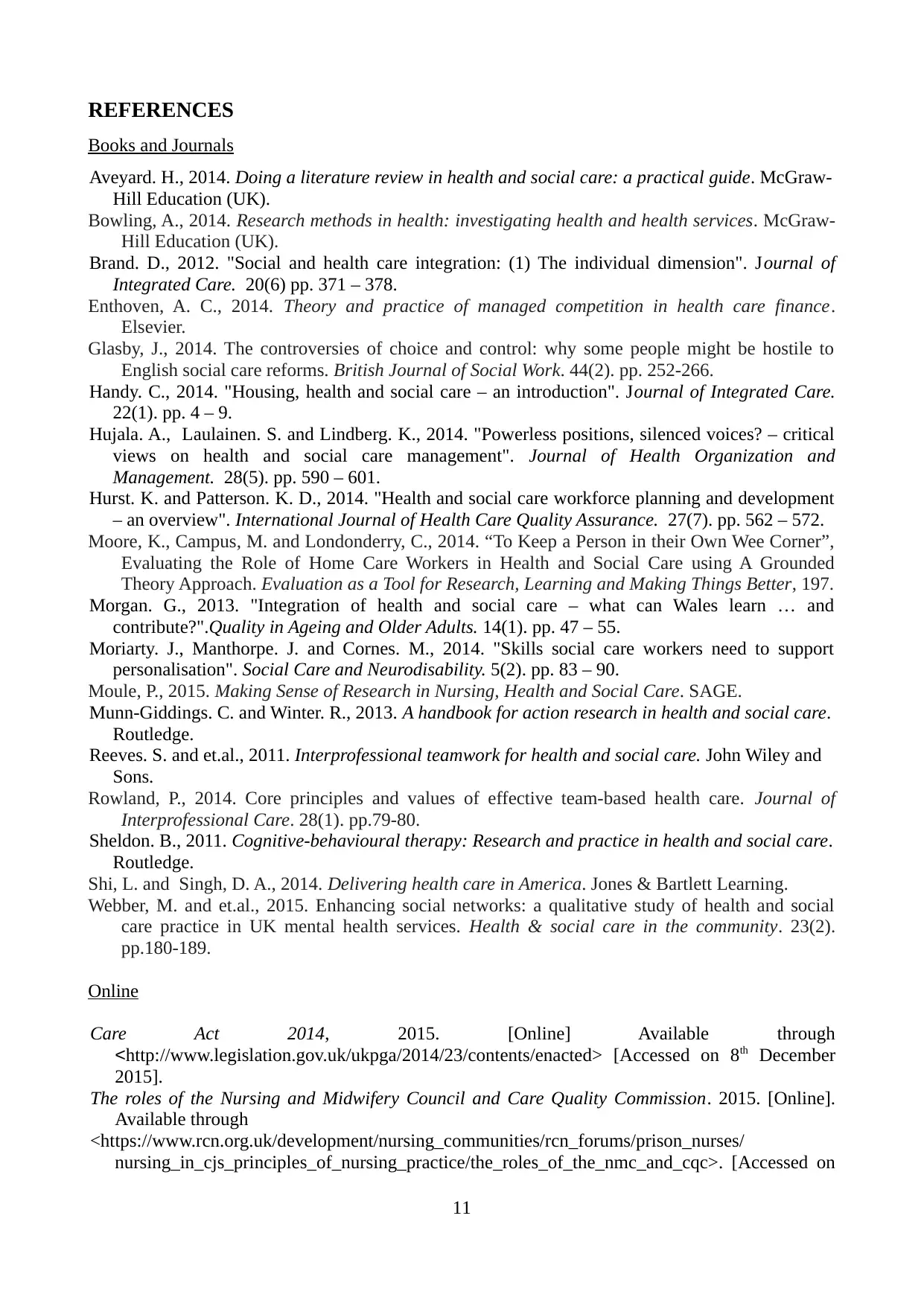
REFERENCES
Books and Journals
Aveyard. H., 2014. Doing a literature review in health and social care: a practical guide. McGraw-
Hill Education (UK).
Bowling, A., 2014. Research methods in health: investigating health and health services. McGraw-
Hill Education (UK).
Brand. D., 2012. "Social and health care integration: (1) The individual dimension". Journal of
Integrated Care. 20(6) pp. 371 – 378.
Enthoven, A. C., 2014. Theory and practice of managed competition in health care finance.
Elsevier.
Glasby, J., 2014. The controversies of choice and control: why some people might be hostile to
English social care reforms. British Journal of Social Work. 44(2). pp. 252-266.
Handy. C., 2014. "Housing, health and social care – an introduction". Journal of Integrated Care.
22(1). pp. 4 – 9.
Hujala. A., Laulainen. S. and Lindberg. K., 2014. "Powerless positions, silenced voices? – critical
views on health and social care management". Journal of Health Organization and
Management. 28(5). pp. 590 – 601.
Hurst. K. and Patterson. K. D., 2014. "Health and social care workforce planning and development
– an overview". International Journal of Health Care Quality Assurance. 27(7). pp. 562 – 572.
Moore, K., Campus, M. and Londonderry, C., 2014. “To Keep a Person in their Own Wee Corner”,
Evaluating the Role of Home Care Workers in Health and Social Care using A Grounded
Theory Approach. Evaluation as a Tool for Research, Learning and Making Things Better, 197.
Morgan. G., 2013. "Integration of health and social care – what can Wales learn … and
contribute?".Quality in Ageing and Older Adults. 14(1). pp. 47 – 55.
Moriarty. J., Manthorpe. J. and Cornes. M., 2014. "Skills social care workers need to support
personalisation". Social Care and Neurodisability. 5(2). pp. 83 – 90.
Moule, P., 2015. Making Sense of Research in Nursing, Health and Social Care. SAGE.
Munn-Giddings. C. and Winter. R., 2013. A handbook for action research in health and social care.
Routledge.
Reeves. S. and et.al., 2011. Interprofessional teamwork for health and social care. John Wiley and
Sons.
Rowland, P., 2014. Core principles and values of effective team-based health care. Journal of
Interprofessional Care. 28(1). pp.79-80.
Sheldon. B., 2011. Cognitive-behavioural therapy: Research and practice in health and social care.
Routledge.
Shi, L. and Singh, D. A., 2014. Delivering health care in America. Jones & Bartlett Learning.
Webber, M. and et.al., 2015. Enhancing social networks: a qualitative study of health and social
care practice in UK mental health services. Health & social care in the community. 23(2).
pp.180-189.
Online
Care Act 2014, 2015. [Online] Available through
<http://www.legislation.gov.uk/ukpga/2014/23/contents/enacted> [Accessed on 8th December
2015].
The roles of the Nursing and Midwifery Council and Care Quality Commission. 2015. [Online].
Available through
<https://www.rcn.org.uk/development/nursing_communities/rcn_forums/prison_nurses/
nursing_in_cjs_principles_of_nursing_practice/the_roles_of_the_nmc_and_cqc>. [Accessed on
11
Books and Journals
Aveyard. H., 2014. Doing a literature review in health and social care: a practical guide. McGraw-
Hill Education (UK).
Bowling, A., 2014. Research methods in health: investigating health and health services. McGraw-
Hill Education (UK).
Brand. D., 2012. "Social and health care integration: (1) The individual dimension". Journal of
Integrated Care. 20(6) pp. 371 – 378.
Enthoven, A. C., 2014. Theory and practice of managed competition in health care finance.
Elsevier.
Glasby, J., 2014. The controversies of choice and control: why some people might be hostile to
English social care reforms. British Journal of Social Work. 44(2). pp. 252-266.
Handy. C., 2014. "Housing, health and social care – an introduction". Journal of Integrated Care.
22(1). pp. 4 – 9.
Hujala. A., Laulainen. S. and Lindberg. K., 2014. "Powerless positions, silenced voices? – critical
views on health and social care management". Journal of Health Organization and
Management. 28(5). pp. 590 – 601.
Hurst. K. and Patterson. K. D., 2014. "Health and social care workforce planning and development
– an overview". International Journal of Health Care Quality Assurance. 27(7). pp. 562 – 572.
Moore, K., Campus, M. and Londonderry, C., 2014. “To Keep a Person in their Own Wee Corner”,
Evaluating the Role of Home Care Workers in Health and Social Care using A Grounded
Theory Approach. Evaluation as a Tool for Research, Learning and Making Things Better, 197.
Morgan. G., 2013. "Integration of health and social care – what can Wales learn … and
contribute?".Quality in Ageing and Older Adults. 14(1). pp. 47 – 55.
Moriarty. J., Manthorpe. J. and Cornes. M., 2014. "Skills social care workers need to support
personalisation". Social Care and Neurodisability. 5(2). pp. 83 – 90.
Moule, P., 2015. Making Sense of Research in Nursing, Health and Social Care. SAGE.
Munn-Giddings. C. and Winter. R., 2013. A handbook for action research in health and social care.
Routledge.
Reeves. S. and et.al., 2011. Interprofessional teamwork for health and social care. John Wiley and
Sons.
Rowland, P., 2014. Core principles and values of effective team-based health care. Journal of
Interprofessional Care. 28(1). pp.79-80.
Sheldon. B., 2011. Cognitive-behavioural therapy: Research and practice in health and social care.
Routledge.
Shi, L. and Singh, D. A., 2014. Delivering health care in America. Jones & Bartlett Learning.
Webber, M. and et.al., 2015. Enhancing social networks: a qualitative study of health and social
care practice in UK mental health services. Health & social care in the community. 23(2).
pp.180-189.
Online
Care Act 2014, 2015. [Online] Available through
<http://www.legislation.gov.uk/ukpga/2014/23/contents/enacted> [Accessed on 8th December
2015].
The roles of the Nursing and Midwifery Council and Care Quality Commission. 2015. [Online].
Available through
<https://www.rcn.org.uk/development/nursing_communities/rcn_forums/prison_nurses/
nursing_in_cjs_principles_of_nursing_practice/the_roles_of_the_nmc_and_cqc>. [Accessed on
11
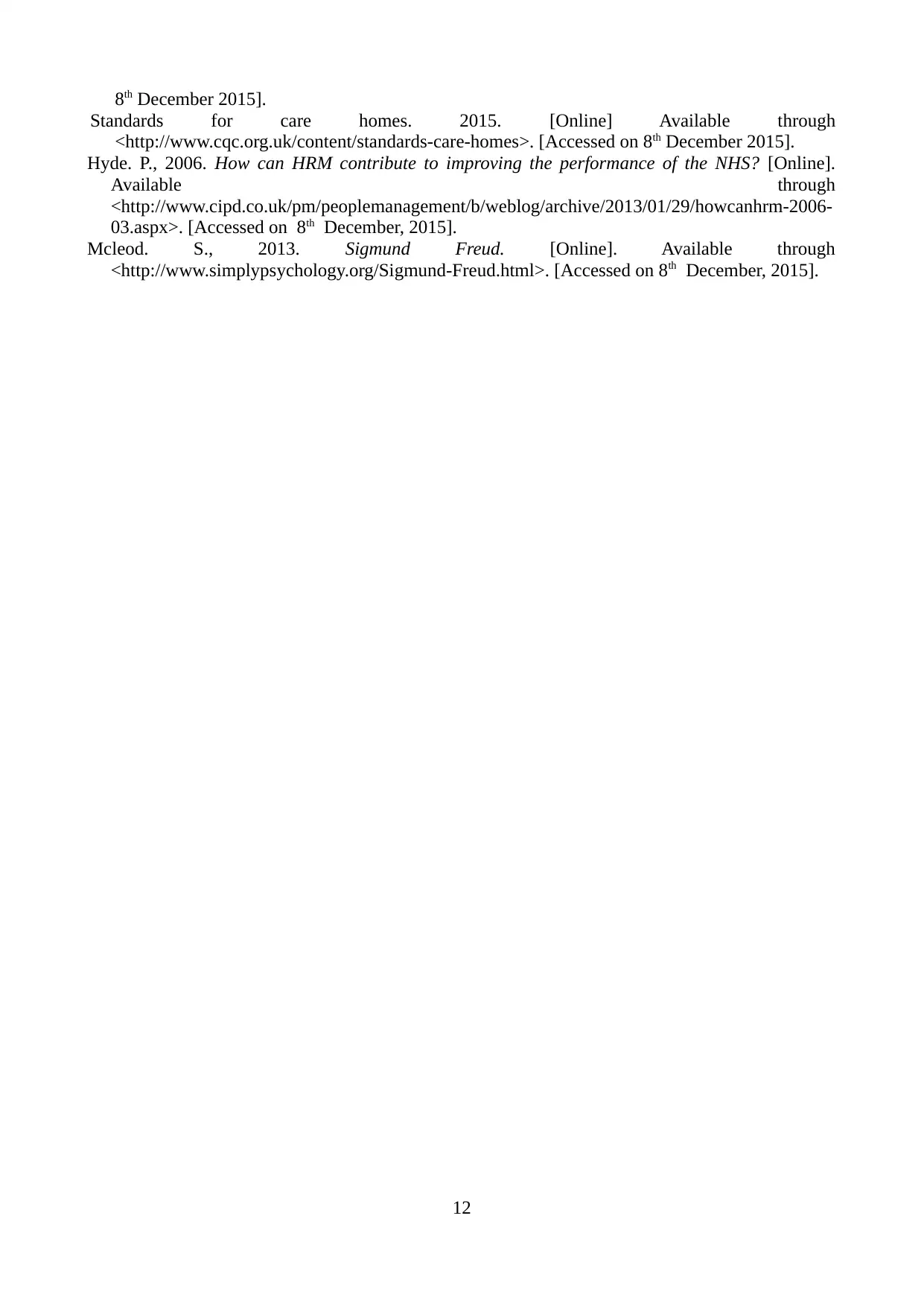
8th December 2015].
Standards for care homes. 2015. [Online] Available through
<http://www.cqc.org.uk/content/standards-care-homes>. [Accessed on 8th December 2015].
Hyde. P., 2006. How can HRM contribute to improving the performance of the NHS? [Online].
Available through
<http://www.cipd.co.uk/pm/peoplemanagement/b/weblog/archive/2013/01/29/howcanhrm-2006-
03.aspx>. [Accessed on 8th December, 2015].
Mcleod. S., 2013. Sigmund Freud. [Online]. Available through
<http://www.simplypsychology.org/Sigmund-Freud.html>. [Accessed on 8th December, 2015].
12
Standards for care homes. 2015. [Online] Available through
<http://www.cqc.org.uk/content/standards-care-homes>. [Accessed on 8th December 2015].
Hyde. P., 2006. How can HRM contribute to improving the performance of the NHS? [Online].
Available through
<http://www.cipd.co.uk/pm/peoplemanagement/b/weblog/archive/2013/01/29/howcanhrm-2006-
03.aspx>. [Accessed on 8th December, 2015].
Mcleod. S., 2013. Sigmund Freud. [Online]. Available through
<http://www.simplypsychology.org/Sigmund-Freud.html>. [Accessed on 8th December, 2015].
12
⊘ This is a preview!⊘
Do you want full access?
Subscribe today to unlock all pages.

Trusted by 1+ million students worldwide
1 out of 12
Related Documents
Your All-in-One AI-Powered Toolkit for Academic Success.
+13062052269
info@desklib.com
Available 24*7 on WhatsApp / Email
![[object Object]](/_next/static/media/star-bottom.7253800d.svg)
Unlock your academic potential
Copyright © 2020–2026 A2Z Services. All Rights Reserved. Developed and managed by ZUCOL.





